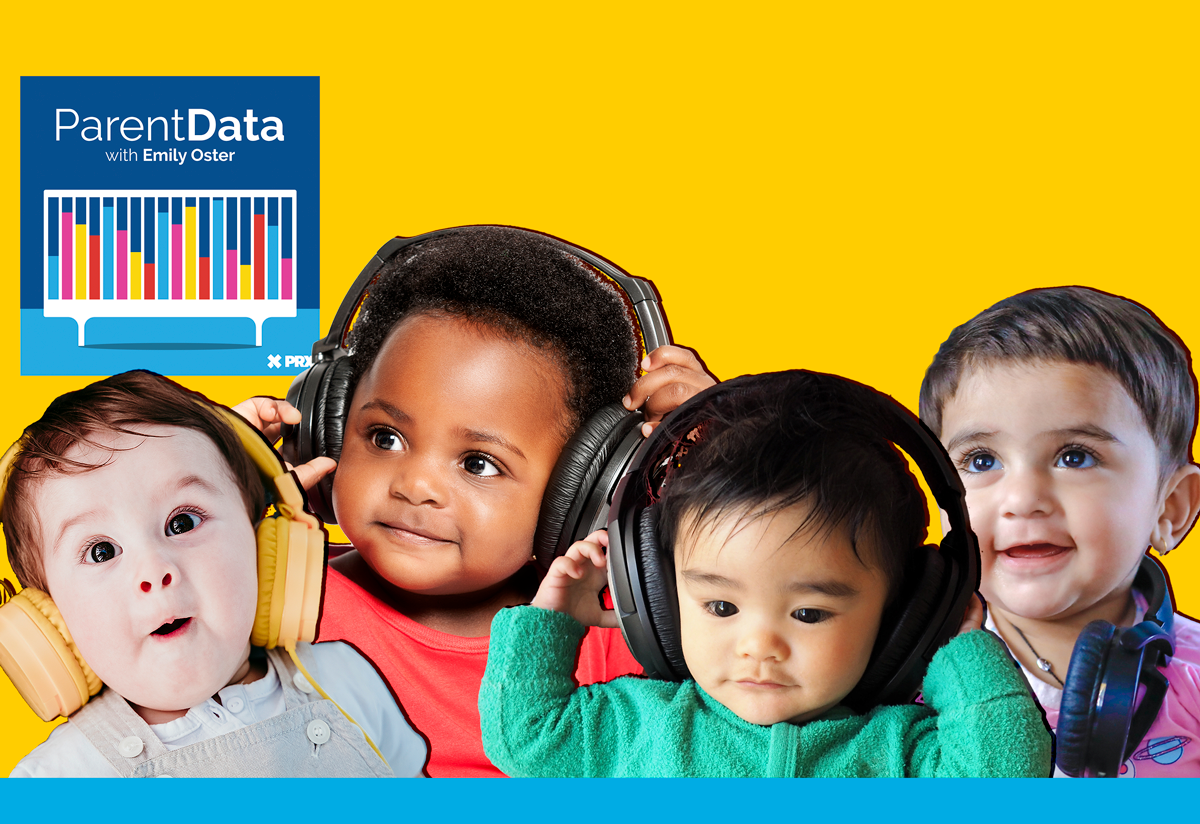Thanks for joining us for a special episode of the ParentData Podcast. A few weeks ago I asked on Instagram if you guys had any questions that were not about parenting, but about me. And I feel a little awkward asking that, but you did have some really interesting questions and so we’re going to try to answer some of them. And I have asked Alex, who works with me to ask the questions so you don’t just hear me answering them, and we’ll see how it goes. So thanks for hanging out with me and doing this, Alex.
Emily:
Let’s do it.
Alex:
Let’s do this. Okay, so we’re going to start with a warmup. Some shorter, easier questions maybe. The first question is, what’s your Zodiac sign?
Emily:
Oh, I think it’s Aquarius. I’m not really into this. I am always getting confused with my birthstone, which is Amethyst, but I think it’s Aquarius.
Alex:
Okay. The second question is how far is a typical morning run?
Emily:
It varies. I would say on a normal aerobic run day, five to six miles. Sometimes I do a little bit of a longer workout, and then usually once on the weekends I do a longer run depending on what kind of thing I’m training for or something, like 10 to 13 miles.
Alex:
What would you do with a day all to yourself?
Emily:
We’ve occasionally had those if my kids are gone with their grandparents, and the answer is basically exactly the same thing that I do otherwise. I would get up and eat breakfast at exactly the same time and then go to work at the same time and eat dinner at the same time. Maybe if they were gone more, I would adapt to my day. But I think basically I would just do the same day that I have already. That’s so boring.
Alex:
What’s your favorite item from Trader Joe’s?
Emily:
Oh, my favorite item from Trader Joe’s. There are these little chocolate covered bonbons, which are cookie on the bottom, and then there’s ice cream and then they’re covered in chocolate. It’s a tie between that and these individual apple pie things, which in graduate school I used to eat so many of, and then I had to stop because it just got out of control. But those are just absolutely delicious.
Alex:
Okay. What’s your go-to mindless TV show?
Emily:
I love the Great British Baking Show, and then maybe one of the Real Housewives.
Alex:
What’s your favorite vacation destination with kids and without?
Emily:
Probably it’s the same. So we go visit our friends in France. We try to go every year if we can, and that is my favorite go-to place because it’s very relaxing and I know it and I think my goal on vacation these days is just to sleep.
Alex:
Awesome. All right, last warmup question. What’s your skincare routine?
Emily:
So I use Cetaphil face wash from the drugstore and I use Cetaphil with SPF 15 moisturizer on my face, and that’s it. And I very occasionally wear makeup, but not very often. It’s kind of boring, but it works.
Alex:
Amazing.
Emily:
It’s not that amazing, I would say, because it’s kind of like, “Is there a secret?” I don’t know if it’s a good routine or not a good routine. It’s very easy.
Alex:
So that’s it for warmup questions. Like you said, people sent in a lot of different questions. I categorized them into different things, like marriage and career. And I think for today we’re going to focus on one or two of those.
Emily:
I’m ready.
Alex:
We’re going to start with your marriage. So first of all, just who are you married to?
Emily:
My husband’s name is Jesse Shapiro. He is an economist who works at Harvard.
Alex:
Okay. How did you and Jesse meet?
Emily:
Jesse and I met in college, so we had a lot of mutual friends, and so we had sort of heard of each other, and we also both worked as research assistants for the same economist. And so one day, I was having dinner with that economist, his name is Chris, at Adam’s House, which was a dorm, and that turned out to be the dorm that Jesse had lived in. And so when we were waiting for someone else to join us for dinner, Jesse came along and because he knew Chris, he said, “Oh, hi.” And Chris said, “Oh, this is Emily. Do you want to join us for dinner?” And so he did. And so we had dinner together.
And because we sort of knew who each other… I don’t know, we kind of had some stuff in common anyway, so I don’t really remember what happened at that dinner. But then the next day we were both taking exams, so I was taking an exam in a class called Images of Alexander the Great, which was a class that I had to take to fulfill some requirement in the Lit and Arts C-Core curriculum. And so it was like a class where you looked at images of Alexander the Great. And Jesse was taking graduate… He was taking a graduate macroeconomics class.
Anyway, so we both had exams at the same time. And then, somebody came into my exam room and said that they had a bomb. They did not turn out to have a bomb, but it was actually quite scary and we all ran away, and then they evacuated all the other buildings. So I ended up outside with no jacket or gloves or anything because I had to run away from this fake bomb. And Jesse was outside and he had all his stuff because he had been evacuated in a more casual manner. And so we ran into each other and we started talking and then he loaned me his gloves, which was very nice. And then I stupidly gave his gloves back, which got rid of the most obvious excuse to see him again. But then when I got back to my dorm room, I wrote to him and said, “Thank you for the gloves.” And then we went out and that was 22 years ago, and that was it.
Alex:
Do your kids know that story with the bomb and everything?
Emily:
I think we’ve told them that story before. Yeah, I think we’ve told them that story before. There was a period of time when they were very interested in how we met and how we got married and stuff, and then they lost interest.
Alex:
All right, that was my own question. Full transparency. All right, back to reader questions. How do you describe your husband and your relationship to your friends?
Emily:
Okay, so one thing I will say is most of my friends know my husband pretty well, and so I’m not sure they need my description. Jesse is very practical. He’s a very practical person. Yeah, he’s a very practical person. Maybe that’s the right word.
Alex:
And how do you describe your relationship?
Emily:
I think our relationship is… I think it’s very good. I think we have a very nice relationship and I think it is actually well captured by some of the stuff that I write about. I think we do a pretty good job separating the business of trying to run our household, the practical nature of that from the fact that we really like each other and like to spend time together. And I think that’s a balance we’ve come to over time is being able to exchange professional emails about logistics while simultaneously maintaining weekly date nights and having a nice time together. It’s been a hard one over time, but I think right now, it works really well. I think one very specific thing is often after we have a discussion, somebody will write a follow-up email that’s just to rehab the items that we covered in this discussion. It’ll be a little bullet pointed list. I think a lot of people find that to be kind of weird. That really works for us.
Alex:
I don’t find that weird. My husband and I, I think, fell in love through spreadsheets.
Emily:
Yeah, I think you need two people to like spreadsheets and bulleted lists, but yeah, but it’s nice.
Alex:
Okay. How did parenthood change your marriage?
Emily:
So I think almost anybody finds the beginning of parenting very challenging, particularly the beginning of parenting with a first kid, because there’s this problem that you have to solve that you have never tried to solve before. It’s a series of problems, but the broad problem is, how do we raise this kid? The individual problems are things like, why isn’t it sleeping and why doesn’t it eat and why is it so cranky and does it need a hat or whatever, these small pieces. But it’s something that you both care enormously about and also don’t have any idea what you’re doing. So I think like everyone, the first year… I sort of remember the first year of my daughter’s life of having more conflict than usual because we were just trying to figure it out and we didn’t always agree. And there were a lot of things where we were unable to have prepped for or unable to have worked out how we were going to navigate questions where we were unsure.
I think that when the kids got older, when we had a second kid and the first kid get older, we worked that stuff out better. I think our lives now really revolve around being parents and we try very hard to separate out the relationship from that. But ultimately, I think almost everybody who has kids, actually perhaps even more so when the kids are in this school age, there’s a lot of logistics and it can be very easy to exclusively do logistics, and there’s a challenge in making sure that you find time to talk about things that are not just literally like who needs to purchase which kinds of Christmas presents for different people at the school this week, which does occupy quite a lot of December, I find.
But I don’t know. Overall I would say we are a much stronger team now than we were before kids, that we have a much clearer shared goal, a much clearer shared agenda for what we’re trying to accomplish. And that’s probably the biggest change.
Alex:
Okay. How do you and your husband divide housework?
Emily:
Okay, so I should start by caveating and saying that we have a lot of help. So we have a really amazing nanny who does a fair amount of house stuff and we have people clean. We do a lot of outsourcing. This is probably part of a longer conversation about how things work in my house, but there are things, of course, that are left. And we try to divide them somewhat evenly, so I cook dinner and he cleans up from dinner. He does a lot of things that I do not, that I’m incapable of doing. So to give you a very specific example, I’m basically afraid of using the phone. I don’t like calling people. I can do it, but it makes me… I’m just irrationally afraid of calling people on the phone. So if my job were call the people who are supposed to pick up the trash, because sometimes they miss the trash, I just won’t do that. I just am afraid to pick up the phone and call people I don’t know. It’s probably there’s something in therapy there. Let’s put it aside.
So he does basically everything that involves any kind of phone calls to anyone, which is actually a fair amount of things. And he also manages all the stuff that has to do with the house. So if you own a house, things constantly break, it would seem. And so he does all that stuff. And then I do much more of the buying the gifts for the teachers and making sure that we’ve signed up for different things at school and doctor’s appointments and those kinds of logistics.
So I think we’ve sort of gotten to a place where we try to separate them into things that are like where somebody has a comparative advantage. It doesn’t always even out, but I would say on the whole, it’s pretty good. And I think we have both gotten very much in the realm of when it feels like we are doing more of that stuff, when we’re overdoing it, to stop and say, “Well what can we do to make this easier? Is there some way to make this task less something we need to do?” So I don’t know, it’s a balance. There’s a lot of stuff to do.
Alex:
So this next question, I guess you could say that you and your husband are both data experts, right? One might say that.
Emily:
Yeah, one might say that. Yeah.
Alex:
So the question is what are fights like between husband and wife data experts?
Emily:
We don’t really fight.
Alex:
Well, how?
Emily:
Not like we never, but we don’t fight about data. Not quite how to describe this. So here’s what I would say. There are things where we wonder what is the right thing to do, where the question is amenable to data. But we both come into that with the same almost somewhat dispassionate approach, and so it is not the kind of thing that we would fight about because the answer is just, “Okay, well we have to go find out what is the evidence about that.” So it takes a lot of the emotional temperature out of something to have this shared way to approach questions. So when there are things we argue about, they’re just not things that have anything to do with data, they’re more things about parenting, although we don’t argue in general very much.
Alex:
And the last question we got about you and Jesse is what do you like to do on date nights?
Emily:
Okay, so our date night, which is very regular, we try very hard to have a date every week. Mostly involves going to dinner. I think that we have a very high taste for walking places, eating dinner relatively quickly, and then walking home. So that’s sort of the ideal date night is when you get to walk to dinner, the dinner happens pretty quickly, and then you get to go home and go to sleep relatively early. We are not people who like to go out and stay out late, but I like a good glass of wine at dinner and a long walk before and after. That’s my happy place. And so we’ve gotten to a good routine in doing that.
Alex:
That sounds wonderful. There are actually some people who live in Providence that were wondering your favorite dinner spot in Providence.
Emily:
So we go to Parkside a lot, which is very simple, but the food is good. It’s down on Main Street. And there’s a tapas place called Palo also in that area, which I also like very much. There’s a lot of very good food in Providence. I don’t think we’re as adventurous as one might be.
Alex:
Okay. There were so many more questions for you, and I think we’re going to leave it here for today. And hopefully if people like this, we’ll do it again. But let’s give a little sneak peek to a future episode. And I’m going to ask you probably the number one question that people sent in, which is some version of how do you manage it all.
Emily:
The answer to that question is with periods of panic, not always as easily as it would seem on social media, and that I have a lot of help. And I have a lot of help both in the newsletter stuff that I’m producing, some of which is from you. Thank you, Alex. But also a lot of help at home. We have a really, really good nanny who makes things function a lot at home. And Jesse, who we spent a lot of this time talking about, is also extremely supportive and helpful. And so, sometimes I worry that it looks like I’m doing all of these things pretty much on my own, and that’s just really not true. So the answer is just a lot of help basically.
Alex:
Great. Well, thank you so much for answering all of these and being so open. I learned some things about you and I’m sure people are going to love learning about you too.
Emily:
Well, thank you for your help on this, Alex. I’ll talk to you perhaps next time.
Thanks for listening. If you like what you heard, subscribe to ParentData in your favorite podcast app and rate and review the show in Apple Podcasts. You can subscribe to the whole newsletter for free at www.parentdata.org. Talk to you soon.
Community Guidelines















Log in